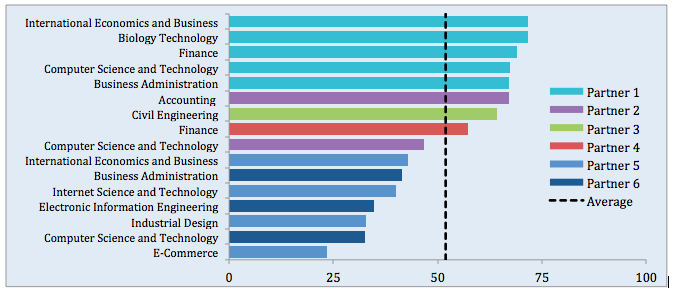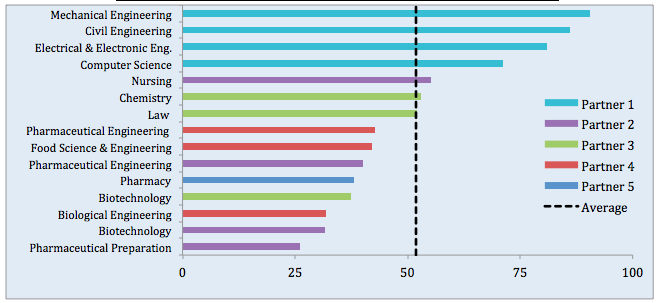Education in East Asia – by the numbers: UK TNE partnerships in China
“There is a large amount of variation between the strengths of the different Chinese partners involved in UK-China TNE programmes, even with the same UK institution”
The following is an extract from the British Council’s Education in East Asia – By the Numbers report, ‘Taking a closer look at the performance of UK universities in forming TNE partnerships in China’, written by Kevin Prest, Senior Analyst at the British Council in China. The British Council’s Services for International Education Marketing (SIEM) team helps UK institutions refine their internationalisation strategies to succeed in East Asia and around the globe. The full report is available to registered members of the British Council website here.
Transnational education is an increasingly important component of UK universities’ international strategies, and it has been widely reported that there are now more international students studying for UK qualifications abroad than there are in the UK. Partnerships with overseas universities are one of the key delivery modes for TNE programmes, and UK universities have been particularly active in establishing these partnerships in China – as of the end of 2014, there were 199 undergraduate level UK-China joint programmes formally approved by the Ministry of Education, excluding joint institutes and branch campuses.
As of the end of 2014, there were 199 undergraduate level UK-China joint programmes formally approved by the Ministry of Education
Focus group research with prospective and current Chinese TNE students shows that the strength of the local partner is one of the most important factors when choosing a TNE programme. Students in both groups see this as at least as important as (and often more important than) the overseas university. It is therefore crucial for universities to choose the right domestic partner for their joint programmes.
While there are many factors for UK universities involved in choosing a local partner, such as location and existing international collaborations, the partner university’s strength in the given subject is certainly one of the most important. However, an analysis of UK universities’ TNE partners in China reveals that there is often a great deal of variation in the subject ranking of local partners.
In the charts and analysis below, Chinese universities’ subject strengths are compared based on the average scores of incoming students in the Gaokao, the university entrance examination taken at the end of senior secondary school. Unlike in the UK, university recruitment in China is based virtually entirely on the results of this examination; places are given to the applicants with the highest scores without considering other factors like extracurricular activities. This makes Gaokao scores a strong indicator of the attractiveness of a course, compared with the same subject at other institutions. This metric is particularly valuable from a recruitment point of view as it shows the real choices students make after considering all factors.
Variation is the rule, not the exception
There is a large amount of variation between the strengths of the different Chinese partners involved in UK-China TNE programmes, even with the same UK institution. It is not uncommon for the same UK university to have several TNE partnerships with different universities in China, including some which are strong in the relevant subject area and others which are much weaker.
The chart below shows the MoE-approved TNE partnerships of one UK institution with six different Chinese partners across a total of 11 different subjects. The scores in this chart represent the subject-specific strength of the Chinese partner institutions on a scale from 0 to 100, where 100 represents the university whose incoming students in the relevant subject have the highest Gaokao scores.

The difference in the strengths of this university’s various partners is immediately obvious from the above chart. Partner 1 is in the top third of Chinese universities for all five subjects that it partners on, with an overall indexed score of 69.4, while Partners 5 and 6 rank well below the national average among universities teaching these subjects in China. Even within a single subject field such as computer science, one of this UK university’s partners is in the top third of institutions offering this subject in China, while another is in the bottom third. This may lead to difficulties in ensuring not only that the two programmes are of equivalent quality, but that they are seen as such by Chinese students.
For the institution in the above chart, the subject-specific rankings of each of its six partners are broadly consistent—partner 1 is above average in all five subjects, while partners 5 and 6 are well below average across the board. However, the chart below shows that this is not always the case. One of this UK university’s partners—a specialist medical university—is significantly stronger in nursing than it is in other subjects such as pharmaceutical preparation. In general there is greater variation in quality across subjects at lower ranked Chinese universities, which should also factor into the key considerations of UK universities when seeking TNE partnerships in China.
